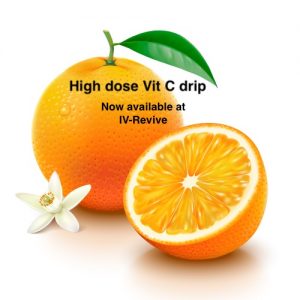What is high-dose vitamin C?
Vitamin C is a nutrient that is found in food, such as oranges, grapefruit, papaya, peppers, and kale, or in dietary supplements. Vitamin C is an antioxidant and helps prevent damage to cells caused by free radicals. It also works with enzymes to play a key role in making collagen. Vitamin C is also called L-ascorbic acid or ascorbate.
Intravenous Vitamin C is a natural, yet extremely powerful tool to directly attack cancer and yes, kill cancer cells.
Patients with cancer have been shown to have significantly depleted levels of Vitamin C compared to individuals without cancer
The scientific evidence for the use of IV Vitamin C as a treatment option and a treatment adjunct in cancer continues to grow.

Why not just use oral Vitamin C?
Oral Vitamin C is limited by 2 significant factors.
First, Vitamin C has a maximum absorption rate of approximately 200 mg/hour. Most Vitamin C supplements far exceed 1,000 mg, let alone 200 mg. If one takes more than 200 mg oral Vitamin C, the vast majority of it is flushed out of the body not used.
Second, and probably most important, oral Vitamin C has a very low peak plasma concentration, likely related to the first point. Oral Vitamin C will not raise plasma concentration significantly higher than 200 microMolar.
The lowest plasma concentration that has been shown to be toxic to cancer cells is 500 microMolar with the target maximum cancer kill rate in the 10-20 millimolar range.
In contrast, IV Vitamin C has been shown to reach peak plasma concentrations of 20-40 millimolar and higher. That is at least a 20,000 times higher peak plasma concentration with IV Vitamin C compared to oral Vitamin C.
Benefits of IV Vitamin C in Cancer
The published evidence for the benefit of IV Vitamin C in cancer includes:
- Improved Quality of Life
- Increased overall survival
- Reduction in pain
- Increased energy
- Increased appetite
- Decreased cancer-associated inflammation
- Prevents cancer-associated sepsis
- Combats infections (viral, bacterial, fungi)
- Reduces side effects and toxicity of chemotherapy
- Reduces side effects and toxicity of radiation
- Augments the cancer kill rate of chemotherapy
- Augments the cancer kill rate of radiation
- Kills cancer cells
- Allows a decrease in the dose of chemotherapy, yet maintains the same cancer kill rate
- Improves surgery recovery time
- Reduces post-surgery pain
- May even decrease post-surgery cancer recurrence
- Kills cancer stem cells (CSC)
All these benefit the body, and it is non-toxic to healthy cells.
Most importantly, the IV use of Vitamin C has repeatedly been shown to be safe at therapeutic dosing as high as 300 grams daily.
Humans are one of several species that have lost the ability to make Vitamin C, hence what Vitamin C we have in our body comes through our diet and/or supplementation alone.
In addition, the human body has very limited capacity to store Vitamin C.
Vitamin C, especially at the higher dosages, only obtainable through IV Vitamin C delivery, has been shown to be a potent pro-oxidant (not antioxidant) in cancer cells. It is this pro-oxidant activity of Vitamin C in cancer cells that generate high levels of Reactive Oxygen Species (ROS), such as H2O2, OH−, ·O2−, required to kill cancer cells.
Vitamin C functions as an anti-oxidant in healthy cells but as a pro-oxidant in cancer cells.
Is high-dose vitamin C approved by the U.S. Food and Drug Administration for use as a cancer treatment?
The U.S. Food and Drug Administration (FDA) has not approved the use of high-dose vitamin C as a treatment for cancer. The FDA does not approve dietary supplements as safe or effective before they are sold.
Are there any evidence available yet?
There’s still no evidence that vitamin C alone can cure cancer, but researchers are studying whether it might boost the effectiveness of other cancer treatments, such as chemotherapy and radiation therapy.
A number of clinical trials (mainly in the USA) are researching this. Some studies are also testing the effects of high-dose intravenous vitamin C when given alongside conventional cancer treatments. But so far, there’s no reliable evidence that intravenous high-dose vitamin C helps treat cancer.
Are there any side effects?
High-dose vitamin C can make many cancer treatment drugs, such as cisplatin, doxorubicin, imatinib and vincristine, less effective. It may also interfere with how radiotherapy works. So it’s important to tell your cancer doctor before having high doses of vitamin C, particularly if you’re planning on using it during, or within a few weeks of, cancer treatment. High-dose vitamin C may also interact with some complementary and alternative therapies. There have been cases of severe cyanide poisoning in people taking laetrile at the same time as high-dose vitamin C. High-dose vitamin C is not suitable for people who have kidney problems, or a condition that causes iron overload (haemachromatosis).Again, talk to your doctor if you have any of these problems and are thinking of taking high-dose vitamin C.
At IV-Revive, we are able to offer intravenous drips of up to 25g Vitamin C as a single infusion.
Please note: this is offered as a supplement and not as treatment for any conditions.
Reference:
The above information is taken from the article Vitamin C and Cancer: Why IVC exceeds norms. (https://www.cancertutor.com/intravenous-vitamin-c/)
Other reference:
